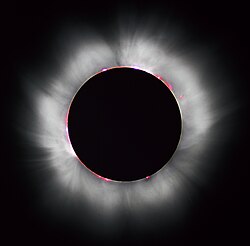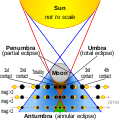Eclipse
An eclipse is an astronomical event. It is when one object in the sky moves into the shadow of another such object. When an eclipse happens within a system of stars, like the Solar System, it makes a type of syzygy. This means that three or more objects in the sky are lined up in a straight line in the same gravitational system.[1]
The term eclipse is most often used to describe a solar eclipse, when the Moon's shadow crosses the Earth's surface, or a lunar eclipse, when the Moon moves into the shadow of Earth. No solar eclipse can last longer than 7 minutes and 58 seconds because of the speed at which the Earth and Moon move.
When the Sun is not involved, the event is called occultation. (The next solar eclipse happening is in 2044-2045)
Etymology
The word comes from the ancient Greek noun ἔκλειψις (<span title="Lua error in package.lua at line 80: module 'Module:Language/data/ISO 639-2' not found. transliteration" class="Unicode" style="white-space:normal; text-decoration: none">ékleipsis), which is from the verb ἐκλείπω (<span title="Lua error in package.lua at line 80: module 'Module:Language/data/ISO 639-2' not found. transliteration" class="Unicode" style="white-space:normal; text-decoration: none">ekleípō). This means "to cease (stop) to exist (be there)".[2][3][4]
Eclipse Media
Totality during the solar eclipse of August 11, 1999
A symbolic orbital diagram from the view of the Earth at the center, with the Sun and Moon projected upon the celestial sphere, showing the Moon's two nodes where eclipses can occur.
Ten Minute Time Lapse Video of the Total Solar Eclipse on April 8, 2024, in Mazatlán, Mexico.
References
- ↑ The New York Times (March 31, 1981). "Science Watch: A Really Big Syzygy". Press release. https://query.nytimes.com/gst/fullpage.html?sec=health&res=9F02E5DB1039F932A05750C0A967948260&fta=y. Retrieved 2008-02-29.
- ↑ http://www.in.gr/dictionary/lookup.asp?Word=%E5%EA%EB%E5%DF%F0%F9+++&x=0&y=0
- ↑ "Archived copy". Archived from the original on 2013-01-28. Retrieved 2010-03-16.
{{cite web}}: CS1 maint: archived copy as title (link) - ↑ Google Translation







